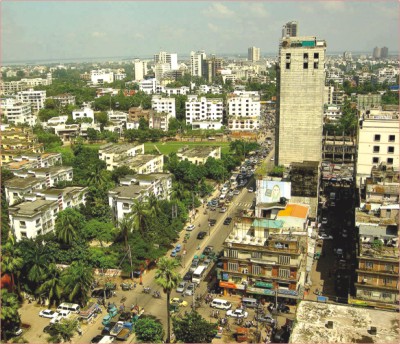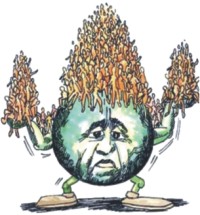Last & Least
Concrete gravitation
Dr Binoy Barman

DHAKA has tremendous power to attract people towards it. The attraction is as solid as concrete. People are as if pulled by the gravitational force of urbanity, its glossy amenities. The rural people are ensnared by this attraction. They madly rush to the city en masse leaving their homestead in villages. They flow in file like ants, in numerous streams, as if spellbound by the tunes of Pied Piper of Hamelin now stationed in Dhaka. Here come the old and the young, the male and the female. Here come students and teachers, businessmen and service holders. Here come the cultured and uncultured, the literate and illiterate. The city streets cry with the heavy tramples of unknown figures.
I just wonder why people gravitate to the city in such madness. What are the advantages of coming and living here? Obviously there are some. There are the opportunities of employment, comforts of livelihood, business, government offices, utility services, educational institutions, hospitals, recreations and a variety of foods and consumer goods. To avail themselves of the opportunities, the rural people stride to the city though they may not get them. Those who are lucky can make fortune here but the unlucky ones remain in the darkness of slimy abode. The happy dreams elude them and they stumble face-down on hard bricks. The people of the lower strata suffer much. The gullible and illiterate chaps carry their loads on shoulders and parade around the city streets for some initial days. At last they take shelter in the sordid slums and begin a humble life of rickshaw or van pullers, in some cases being promoted to drug peddlers and other sorts of criminals. They are no more village folks but city dwellers. They are the denizens of illusion.
Just stop a bit to look around. In the last few decades the population of Dhaka has increased rapidly. Statistics reveal that urban population has grown during 19701990 at the rate of 7.4%, during 19902000 at 3.7% and during 20002008 at 3.3%. By now the city has been overpopulated. It has been sick with the pressure of people. At present the population of Dhaka is about one crore. It has been forecast that it will be two crore by 2030. Can you imagine the situation then? Houses and pavements are thrust with men and women. They are dashing one another in their standing and movement. They are breathing and sneezing on one another. There is no lonely place -- no place to rest in peace. A horrible situation indeed!
What is the condition of Dhaka now? On the one hand the high-rises are covering the skyline and on the other the slums are being expanded on the gutters. Its air is polluted, its water is contaminated; and its streets are jammed with vehicles. To breathe city air means taking in poison. The water in the canals and rivers around the city has been so toxic that even the aquatic creatures cannot live there; no humans can imagine using it. The traffic jam in the city is so acute that one has to spend an hour to cross a distance of ten minutes.
The city has been unliveable to a great extent. It is a dying city -- a labyrinth of lost hopes.
Still people have to live here. They come and live here for employment, for enjoyment. They struggle to survive. They succeed or fail. It is a hard struggle. Once in city they can hardly leave it. They are as if charmed by the concrete touch. To lead a life, one needs money; and money is what flies in the air of Dhaka. People desperately move and try every trick to grab it. Dhaka binds its people with the dream of money. It holds in front of them the prospect of survival and better living. Outside Dhaka, such prospect and dream is dim and rare. So why shouldn't they love to live here?
What is the matter? Something has been wrong with the state policy. Everything has been centralised in the last few decades, particularly since the independence of Bangladesh. Dhaka has been made the centre of administration, politics, economy and culture. In the way, I suppose, the capital has been awarded the 'capital punishment'. Over the years the city land has been crammed with buildings of administration, business, housing and other sorts. The city has sprawled in an unplanned way. All the traces of greenery have been effaced and the natural water bodies either have been filled or narrowed. This is like choking a living entity. The policy of centralisation has killed the dream of a good city.

Why doesn't the government take a policy of decentralisation and disperse all establishments around the country. People would not like to rush to the city if they find the employment near their village home. Let the industries be established in remote areas where workers are easily available. Spread the administrative, legal, medical, educational and all other services all around. Don't concentrate everything in Dhaka to make it a 'concentration camp'. Establish more government offices, courts, hospitals, schools, colleges and universities in rural areas. Prevent NGOs and foreign missions and organisations from setting up their offices all in Dhaka. Construct roads and develop other communication facilities in far-flung regions. Supply electricity and gas. Nourish rural cultures rather than posh city ones. Build amusement parks and develop other recreational facilities there. Make villages alive with the activities of sports, literature, music, drama, film. Decentralise, decentralise and decentralise -- that is the only way to save the city. Decentralisation will work against the force of concrete gravitation.
In the age of technology it is easier to decentralise. The government can resort to e-governance, taking advantage of computer and internet. More and more use of information technology should be ensured. There may be teleconference and videoconference instead of physical meeting. It is a necessary step for establishing a Digital Bangladesh, too. Quality education can be spread to remote areas, introducing and modernising distance learning. Information technology will facilitate decentralisation. If we fail to take the opportunity to decentralise, we are destined to fail as a nation. But one thing must be ensured above all. It is population control. At present the population in Bangladesh is growing at the rate of 1.29%. It is an alarming rate. If we cannot control population, all others nice efforts will be jeopardised.
I believe people still would love to live in village if there are all amenities of life there. Villages have many advantages over cities. Greenery, open space, fresh air and water, unadulterated foods, low price of commodities, simplicity of people and close-knit community are some of the merits of living in rural areas. These are such facilities which enhance longevity and ensure peace in life. These cannot be purchased in town spending money. There may be comforts in town measured in material gains but the spirit starves and dies there. The rural environment nurtures human spirit which finds its umbilical cord anchored deep here. Human spirit feels at home in village where it is enriched with the magical touch of nature. It is still a better place to live.
It is the prime challenge in front of Bangladesh now to resist the gravitational pull of population towards urban spaces. It concerns not only Dhaka but all other cities, which demand prioritised agenda for sound existence. The consequence of concrete gravitation is grave. If the trend cannot be resisted, it will turn the 'concrete jungle' into a 'concrete grave'. That will be the final resting place for us, a place where the dead roams.
The writer is Assistant Professor and Head, Department of English, Daffodil International University.
|
